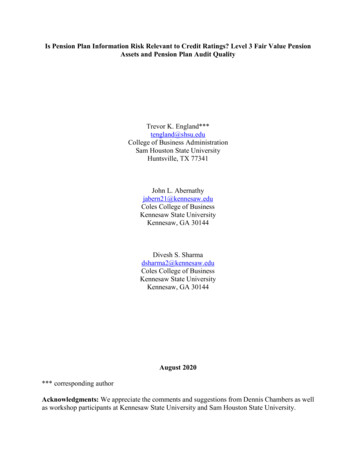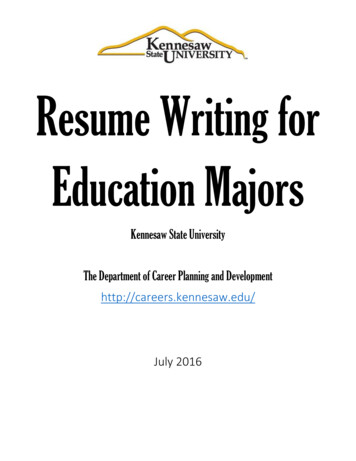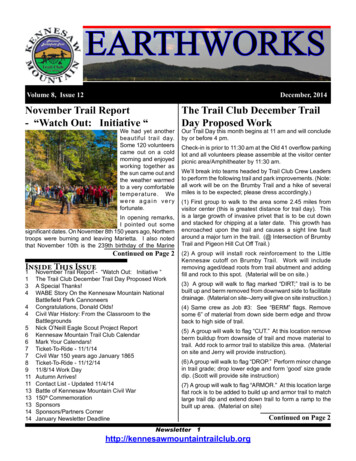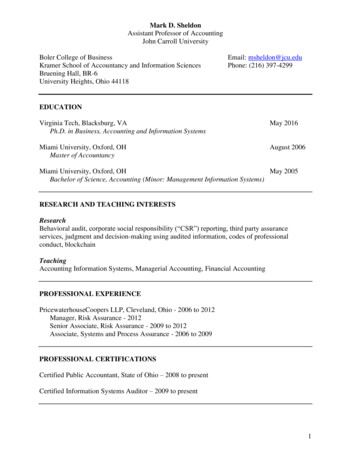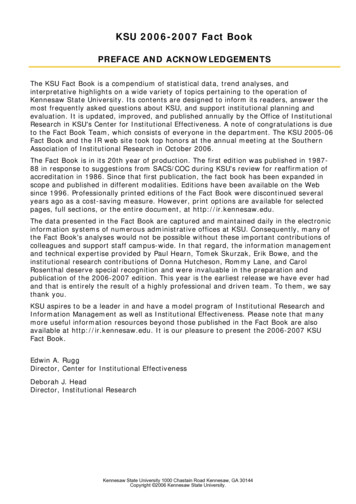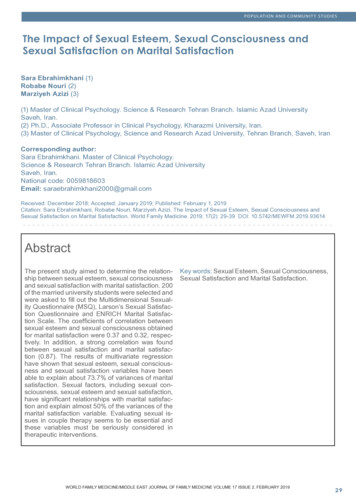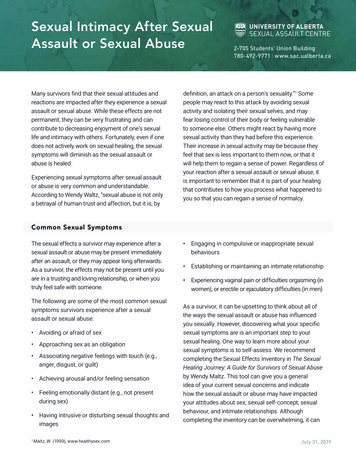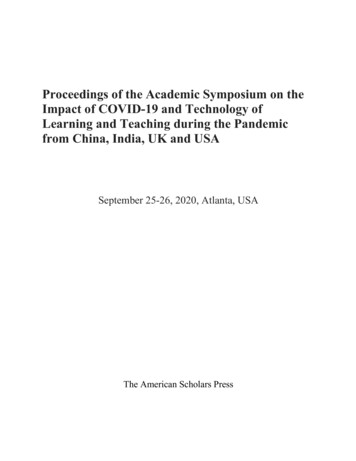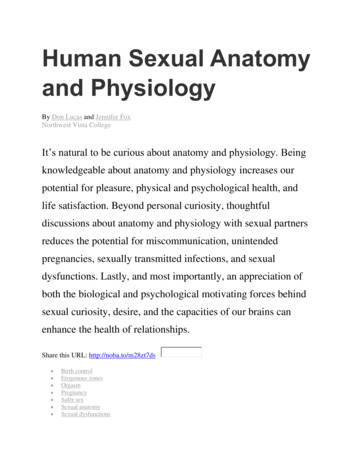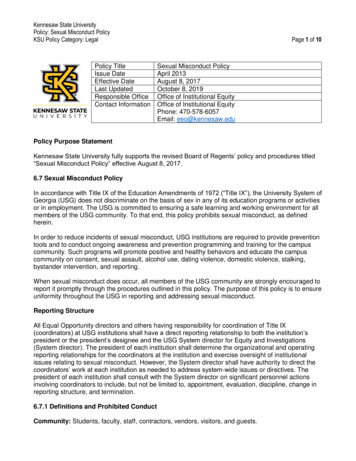
Transcription
Kennesaw State UniversityPolicy: Sexual Misconduct PolicyKSU Policy Category: LegalPolicy TitleIssue DateEffective DateLast UpdatedResponsible OfficeContact InformationPage 1 of 10Sexual Misconduct PolicyApril 2013August 8, 2017October 8, 2019Office of Institutional EquityOffice of Institutional EquityPhone: 470-578-6057Email: eeo@kennesaw.eduPolicy Purpose StatementKennesaw State University fully supports the revised Board of Regents’ policy and procedures titled“Sexual Misconduct Policy” effective August 8, 2017.6.7 Sexual Misconduct PolicyIn accordance with Title IX of the Education Amendments of 1972 (“Title IX”), the University System ofGeorgia (USG) does not discriminate on the basis of sex in any of its education programs or activitiesor in employment. The USG is committed to ensuring a safe learning and working environment for allmembers of the USG community. To that end, this policy prohibits sexual misconduct, as definedherein.In order to reduce incidents of sexual misconduct, USG institutions are required to provide preventiontools and to conduct ongoing awareness and prevention programming and training for the campuscommunity. Such programs will promote positive and healthy behaviors and educate the campuscommunity on consent, sexual assault, alcohol use, dating violence, domestic violence, stalking,bystander intervention, and reporting.When sexual misconduct does occur, all members of the USG community are strongly encouraged toreport it promptly through the procedures outlined in this policy. The purpose of this policy is to ensureuniformity throughout the USG in reporting and addressing sexual misconduct.Reporting StructureAll Equal Opportunity directors and others having responsibility for coordination of Title IX(coordinators) at USG institutions shall have a direct reporting relationship to both the institution’spresident or the president’s designee and the USG System director for Equity and Investigations(System director). The president of each institution shall determine the organizational and operatingreporting relationships for the coordinators at the institution and exercise oversight of institutionalissues relating to sexual misconduct. However, the System director shall have authority to direct thecoordinators’ work at each institution as needed to address system-wide issues or directives. Thepresident of each institution shall consult with the System director on significant personnel actionsinvolving coordinators to include, but not be limited to, appointment, evaluation, discipline, change inreporting structure, and termination.6.7.1 Definitions and Prohibited ConductCommunity: Students, faculty, staff, contractors, vendors, visitors, and guests.
Kennesaw State UniversityPolicy: Sexual Misconduct PolicyKSU Policy Category: LegalPage 2 of 10Complainant: An individual lodging a complaint. The complainant may not always be the allegedvictim.Consent: Words or actions that show a knowing and voluntary willingness to engage in mutuallyagreed-upon sexual activity. Consent cannot be gained by force, intimidation or coercion; by ignoringor acting in spite of objections of another; or by taking advantage of the incapacitation of anotherwhere the respondent knows or reasonably should have known of such incapacitation. Minors underthe age of 16 cannot legally consent under Georgia law.Consent is also absent when the activity in question exceeds the scope of consent previously given.Past consent does not imply present or future consent. Silence or an absence of resistance does notimply consent.Consent can be withdrawn at any time by either party by using clear words or actions.Dating Violence: Violence committed by a person who is or has been in a social relationship of aromantic or intimate nature with the alleged victim. Dating violence includes, but is not limited to,sexual or physical abuse or the threat of such abuse. Dating violence does not include acts coveredunder the definition of domestic violence.Domestic Violence: Violence committed by a current or former spouse or intimate partner of thealleged victim; by a person with whom the alleged victim shares a child in common; by a person whois cohabitating with, or has cohabitated with, the victim as a spouse or intimate partner; or by a personsimilarly situated to a spouse of the alleged victim.Incapacitation: The physical and/or mental inability to make informed, rational judgments. This canresult from mental disability, sleep, involuntary physical restraint, status as a minor under the age of16, or from intentional or unintentional taking of alcohol and/or other drugs. Whether someone isincapacitated is to be judged from the perspective of an objectively reasonable person.Nonconsensual Sexual Contact: Any physical contact of a sexual nature with another personwithout the person’s consent. This includes, but is not limited to, touching (or penetrating) of aperson’s intimate parts (such as genitalia, groin, breasts, or buttocks); touching (or penetrating) aperson with one’s own intimate parts; or forcing a person to touch his or her own or another person’sintimate parts.Confidential Employees: Institution employees who have been designated by the institution’scoordinator to talk with an alleged victim in confidence. Confidential employees must report only thatthe incident occurred and provide date, time, location, and name of alleged respondent (if known)without revealing any information that would personally identify the alleged victim.This minimal reporting must be submitted in compliance with Title IX and the Jeanne Clery Disclosureof Campus Security Policy and Campus Crime Statistics Act (Clery Act). Confidential employees maybe required to fully disclose details of an incident in order to ensure campus safety.Privileged Employees: Individuals employed by the institution to whom a complainant or allegedvictim may talk to in confidence, as provided by law. Disclosure to these employees will notautomatically trigger an investigation against the complainant’s or alleged victim’s wishes. Privilegedemployees include those providing counseling, advocacy, health, mental health, or assault-related
Kennesaw State UniversityPolicy: Sexual Misconduct PolicyKSU Policy Category: LegalPage 3 of 10services (e.g., sexual assault resource centers, campus health centers, pastoral counselors, andcampus mental health centers) or as otherwise provided by applicable law. Exceptions toconfidentiality exist where the conduct involves suspected abuse of a minor (in Georgia, under theage of 18) or otherwise provided by law, such as imminent threat or serious harm.Respondent: Individual who is alleged to have engaged in conduct that violates this policy.Responsible Employees: Those employees who must promptly and fully report complaints of orinformation regarding sexual misconduct to the coordinator. Responsible employees include anyadministrator, supervisor, faculty member, or other person in a position of authority who is not aconfidential employee or privileged employee. Student employees who serve in a supervisory,advisory, or managerial role are in a position of authority for purposes of this policy (e.g., teachingassistants, residential assistants, student managers, orientation leaders).Sexual Exploitation: Taking nonconsensual or abusive sexual advantage of another for one’s ownadvantage or benefit, or for the benefit or advantage of anyone other than the one being exploited.Examples of sexual exploitation may include, but are not limited to, the following:1. Invasion of sexual privacy;2. Prostituting another individual;3. Nonconsensual photos, video, or audio of sexual activity;4. Nonconsensual distribution of photo, video, or audio of sexual activity, even if the sexualactivity was consensual;5. Intentional observation of nonconsenting individuals who are partially undressed, naked, orengaged in sexual acts;6. Knowingly transmitting an STD or HIV to another individual through sexual activity;7. Intentionally and inappropriately exposing one’s breasts, buttocks, groin, or genitals in nonconsensual circumstances; and/or8. Sexually-based bullying.Sexual Harassment: Unwelcome verbal, nonverbal, or physical conduct, based on sex or on genderstereotypes, that is implicitly or explicitly a term or condition of employment or status in a course,program, or activity; is a basis for employment or educational decisions; or is sufficiently severe,persistent, or pervasive as to interfere with one’s work or educational performance, creating anintimidating, hostile, or offensive work or learning environment, or interfering with or limiting one’sability to participate in or to benefit from an institutional program or activity.Sexual Misconduct: Includes, but is not limited to, such unwanted behavior as dating violence,domestic violence, nonconsensual sexual contact, sexual exploitation, sexual harassment, andstalking.Stalking: Engaging in a course of conduct directed at a specific person that would cause areasonable person to fear for his or her safety or the safety of others or suffer substantial emotionaldistress. Course of conduct means two or more acts, including, but not limited to, acts in which thestalker directly, indirectly, or through third parties, by any action, method, device, or means, follows,monitors, observes, surveils, threatens, or communicates to or about a person, or interferes with aperson’s property. Reasonable person means a reasonable person under similar circumstances andwith similar identities to the victim. Substantial emotional distress means significant mental sufferingor anguish that may, but does not necessarily, require medical or other professional treatment orcounseling.
Kennesaw State UniversityPolicy: Sexual Misconduct PolicyKSU Policy Category: LegalPage 4 of 106.7.2 Reporting Sexual MisconductA complainant of sexual misconduct may, but need not, file a criminal complaint with law enforcementofficials; file a misconduct report with a responsible employee or coordinator; or file both. A report maybe filed anonymously, although anonymous reports may make it difficult for the institution to addressthe complaint. Any individual who believes that he or she has been a victim of sexual misconduct isencouraged to report allegations of sexual misconduct promptly.All reports of sexual misconduct alleged to have been committed by a student must be handledconsistently with requirements set forth in the Board of Regents Policy Manual, Section 4.6.5,Standards for Institutional Student Conduct Investigation and Disciplinary Proceedings.All reports of sexual misconduct alleged to have been committed by a non-student member of theinstitution community will be addressed and/or resolved through the institution’s and the Board ofRegents’ applicable policies for discipline of non-students.6.7.2 (A) Institutional ReportsComplainants of sexual misconduct who wish to file a report with the institution should notify aresponsible employee or the coordinator. Responsible employees informed about sexualmisconduct allegations involving any student should not attempt to resolve the situation but mustnotify and report all relevant information to the coordinator as soon as practicable. Confidentialemployees are not bound by this requirement but may be required to report limited informationabout incidents without revealing the identities of the individuals involved to the Title IXcoordinator, consistent with their ethical and legal obligations. All members of the UniversitySystem of Georgia institutions’ communities are encouraged to report incidents of sexualmisconduct promptly.The coordinator’s identity and contact information shall be published prominently by eachinstitution on the institution’s website, as well as in any relevant publication. Each institution mayalso choose to have deputy Title IX coordinators to whom reports may be made. Institutionsshould encourage complainants to report their complaints in writing, though oral complaints shouldalso be accepted, taken seriously, and investigated to the extent possible. While complaintsshould be made as quickly as possible following an alleged incident of sexual misconduct, allreports should be accepted regardless of when they are reported.The Title IX Coordinator’s contact information is as follows.Donna Davis ReddixDirector of Institutional Equity and Title IX CoordinatorOffice of Institutional Equity440 Bartow Avenue NW, MD #2702English Building, Suite 202Kennesaw, GA 30144-5591470-578-2904eeo@kennessaw.eduThe coordinator shall refer to the System director any allegation(s) of sexual misconduct thatcould, standing alone as reported, lead to the suspension or expulsion of the respondent(s). TheSystem director will work with the institution to determine whether any interim measure(s) are
Kennesaw State UniversityPolicy: Sexual Misconduct PolicyKSU Policy Category: LegalPage 5 of 10necessary and to assign an investigator who will work under the direction of the System director ordesignee, if directed by System director. If an allegation is not initially identified as one that wouldlead to the suspension or expulsion of the respondent(s), but facts arise during the course of theinvestigation that would require transfer to the System director, the Title IX Coordinator shalltransfer oversight to the System director or designee. The System director shall have thediscretion to retain oversight or transfer oversight to the institution.6.7.2 (B) Law Enforcement ReportsBecause sexual misconduct may constitute criminal activity, a complainant also has the option,should he or she so choose, of filing a report with campus or local police for his or her ownprotection and that of the surrounding community. The institution may assist the complainant inreporting the situation to law enforcement officials.Complainants considering filing a report of sexual misconduct with law enforcement shouldpreserve any evidence of sexual misconduct, including but not limited to, the following:1.2.3.4.5.6.Clothing worn during the incident, including undergarments;Sheets, bedding, and condoms, if used;Lists of witnesses with contact information;Text messages, call history, social media posts;Pictures of injuries; and/orVideos.6.7.2 (C) Anonymous ReportsEach institution shall provide a mechanism by which individuals can report incidents of allegedsexual misconduct anonymously. Complainants should understand, however, that it will be moredifficult for the institution to investigate and to take action upon anonymous reports.6.7.2 (D) RetaliationAnyone who, in good faith, reports what he or she believes to be misconduct under this policy, orwho participates or cooperates in, or is otherwise associated with any investigation, shall not besubjected to retaliation. Anyone who believes that he or she has been the target of retaliation forreporting, participating, cooperating in, or otherwise being associated with an investigation shouldimmediately contact the coordinator for the institution. Any person found to have engaged inretaliation in violation of this policy shall be subject to disciplinary action.6.7.2 (E) False ComplaintsIndividuals are prohibited from intentionally giving false statements to a system or institutionofficial. Any person found to have intentionally submitted false complaints, accusations, orstatements, including during a hearing, in violation of this policy shall be subject to appropriatedisciplinary action (up to and including suspension or expulsion) and adjudicated under thestudent conduct policy.6.7.2 (F) AmnestyIndividuals should be encouraged to come forward and to report sexual misconductnotwithstanding their choice to consume alcohol or to use drugs. Information reported by anindividual during an investigation concerning the use of drugs or alcohol will not be used againstthe particular individual in a disciplinary proceeding or voluntarily reported to law enforcement;however, individuals may be provided with resources on drug and alcohol counseling and/oreducation, as appropriate.
Kennesaw State UniversityPolicy: Sexual Misconduct PolicyKSU Policy Category: LegalPage 6 of 106.7.3 Handling Reports of Sexual Misconduct6.7.3 (A) Support ServicesOnce a student or employee makes a complaint or receives notice that a complaint has beenmade against him or her, or the coordinator otherwise learns of a complaint of sexual misconduct,the complainant, respondent, and alleged victim (where applicable) should receive writteninformation about support services, such as counseling, advocacy, housing assistance, academicsupport, disability services, health and mental services, and legal assistance, available at thestudent’s institution.Information on support services will be provided regardless of whether an individual elects to goforward with filing a formal complaint of sexual misconduct or with notifying law enforcement.Information on support services also will be provided to students and employees, regardless ofwhere the alleged misconduct occurs.Available support services should also be listed on the institution’s Title IX website.On-Campus ResourcesAll on-campus resources are available on all campuses.ResourceKSU StudentHealth ServicesKSU CounselingandPsychologicalServices CenterAddressPhone Number and YesKennesaw Campus3215 Campus Loop RoadKennesaw, GA etta Campus955 Technology WayRecreation & WellnessCenter, Building S1Marietta, GA 30060Kennesaw Campus585 Cobb Avenue NWKennesaw Hall 2401Kennesaw, GA 70-578-6600YesMarietta Campus470-578-7391860 Rossbacher WayJoe Mack Wilson StudentCenter, Room A-170 (BehindChick-fil-A)Marietta, GA 30060Yes
Kennesaw State UniversityPolicy: Sexual Misconduct PolicyKSU Policy Category: LegalOffice of theOmbudsPage 7 of 10Kennesaw Campus470-578-7773ombuds@kennesaw.eduYesMarietta Campus470-578-7773ombuds@kennesaw.eduYesKennesaw CampusStudent Health Services3215 Campus Loop RoadKennesaw, GA 30144470-578-4257ovs@kennesaw.eduYesMarietta Campus920 Hornet LoopNorton Hall, Room 316Marietta, GA 30060470-578-4496ovs@kennesaw.eduYes440 Bartow Avenue NWEnglish Building, Suite 202Kennesaw, GA 30144470-578-6057eeo@kennesaw.eduNoDean of Students 395 Cobb Avenue NWCarmichael Student Center,Suite 274Kennesaw, GA n Resources Kennesaw Campus3391 Town Point Drive NWSuite 2000Kennesaw, GA 30144470-578-6030hr@kennesaw.eduNoMarietta Campus900 Hornet LoopAdministration BuildingSuite B111Marietta, GA 30060470-578-3503hr@kennesaw.eduNoKennesaw Campus351 Paulding Avenue NWKennesaw, GA 30144470-578-6666police@kennesaw.eduNoMarietta Campus920 Hornet LoopNorton Residence Hall (R2)Ground FloorMarietta, GA 30060470-578-6666police@kennesaw.eduNoOffice of VictimServices (OVS)Office ofInstitutionalEquity/Title IXCoordinatorDepartment ofPublic Safety &University Police
Kennesaw State UniversityPolicy: Sexual Misconduct PolicyKSU Policy Category: LegalPage 8 of 10Student Conductand AcademicIntegrity (SCAI)395 Cobb Avenue NWCarmichael Student CenterSuite 274EKennesaw, GA eCenter395 Cobb Avenue NWCarmichael Student CenterRoom 164Kennesaw, GA 30144470-578-7858wrc@kennesaw.eduNoHousing andResidence LifeKennesaw Campus1074 Canton Place NWUniversity Village 6000Suite 124Kennesaw, GA 30144470-578-5483housing@kennesaw.eduNoMarietta Campus626 Cheshier RoadBuilding R-10Marietta, GA 30060470-578-5483housing@kennesaw.eduNoOff-Campus ResourcesResourceAddressLocal PoliceYWCA Women’sCrisis CenterVictim Informationand NotificationEveryday (VINE)Cobb CountyRape, Abuse andIncest NationalNetworkU.S. Department ofJustice, Office onViolence AgainstWomenU.S. Department ofEducation, Office forCivil Rights6.7.3 (B) Interim MeasuresPhone Number91148 Henderson St SWMarietta, GA wdcrobcolp01.ed.gov/CFAPPS/OCR/contactus.cfm
Kennesaw State UniversityPolicy: Sexual Misconduct PolicyKSU Policy Category: LegalPage 9 of 10Interim measures may be undertaken at any point after the institution becomes aware of anallegation of sexual misconduct and should be designed to protect the alleged victim and thecommunity.Before an interim suspension is issued, the institution must make all reasonable efforts to give therespondent the opportunity to be heard, consistent with the provisions in the Board of RegentsPolicy Manual, Section 4.6.5.6.7.3 (C) JurisdictionEach USG institution shall take necessary and appropriate action to protect the safety and wellbeing of its community. Sexual misconduct allegedly committed by a student is addressed by thispolicy when the misconduct occurs on institution property, or at institution-sponsored or affiliatedevents, or off-campus, as defined by the institution’s student conduct policies.6.7.3 (D) AdvisorsBoth the alleged victim and respondent, as parties to the matter, shall have the opportunity to usean advisor (who may or may not be an attorney) of the party’s choosing at the party’s ownexpense for the express purpose of providing advice and counsel, pursuant to the provisions ofthe Board of Regents Policy Manual, Section 4.6.5.6.7.3 (E) Informal ResolutionsAllegations of sexual misconduct may be resolved informally, without a determination ofmisconduct, if all of the following are met:1. When complainant(s) and respondent agree to an informal resolution;2. When the initial allegation could not result in expulsion;3. When the complainant(s) and respondent(s) agree to the terms of the informal resolution;and4. When the investigator concludes that informal resolution is in the best interest of theparties and the institution’s community.The alleged victim(s) and respondent(s) have the option to end informal resolution discussionsand request a formal process at any time before the terms of an informal resolution are reached.However, matters resolved informally shall not be appealable.6.7.3 (F) TimeframeEfforts will be made to complete the investigation within a reasonable timeframe, which will bedetermined based upon the allegations, availability of witnesses and/or evidence, etc. in aparticular case. When the timeframe will extend past the reasonable timeframe, the parties will beinformed of the delay and the reason for the delay. The investigator shall keep the partiesinformed of the status of the investigation.6.7.4 InvestigationsAll sexual misconduct investigations involving a student respondent, whether overseen by theinstitution’s coordinator or the System director, shall follow the investigation process set forth in theBoard of Regents Policy Manual, Section 4.6.5, Standards for Institutional Student ConductInvestigation and Disciplinary Proceedings.6.7.5 Hearings, Possible Sanctions and AppealsAll sexual misconduct hearings, sanctions, and appeals involving a student respondent, whether
Kennesaw State UniversityPolicy: Sexual Misconduct PolicyKSU Policy Category: LegalPage 10 of 10overseen by the institution’s coordinator or the System director, shall follow the investigation processset forth in the Board of Regents Policy Manual, Section 4.6.5, Standards for Institutional StudentConduct Investigation and Disciplinary Proceedings.All sexual misconduct adjudication involving an employee respondent shall be addressed utilizing theinstitution’s employment policies and procedures.
Email: eeo@kennesaw.edu Policy Purpose Statement Kennesaw State University fully supports the revised Board of Regents' policy and procedures titled "Sexual Misconduct Policy" effective August 8, 2017. 6.7 Sexual Misconduct Policy In accordance with Title IX of the Education Amendments of 1972 ("Title IX"), the University System of
